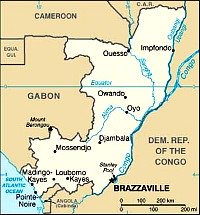Congolese Food
Congolese food follow the same theme found across the continent. You will find food from cassava (yaka), palm fruit (mouamba ngagi), rice, maize, beans, peanuts, various fresh vegetables, sweet potatoes, cassava leaves (ntoba), yams, plantain, games, fresh fish, eggs, and poultry.
Congolese food is cuisine from the two countries that border the Congo River. They are the Democratic Republic of the Congo and the Republic of the Congo.
They are located in the central-western part of sub-Saharan Africa. Neighbouring countries include Angola, Burundi, Central African Republic, Rwanda, South Sudan, Tanzania, Uganda and Zambia.

The food from this region is similar t other parts of Africa with cooking variations. You can always see the same theme running through acroos the board. Stables like cassava, millet, plantain, rice, yam, palm oil, maize, taro, varieties of legumes and nuts.
Eleusine coracana, otherwise referred to as Finger millet or luku by the natives was the staple food in this beautiful African paradise.
Manioc was introduced by the European traders and has since gained the prime stage as the staple in both Congos.
What Are Popular Congolese Food?
- Cassava Leaves Soup
Also called Pondu stew, this is a very popular Congolese soup dish prepared from chopped cassava leaves, cooked with palm oil, fresh fish and peanut butter. It is served with luku (fufu) made from millet or cassava or nshima.
- Palm Fruit Soup
Also referred to as Mouamba ngagi. It is a rich African soup dish (stew) prepared from using the squeezed juice from freshly boiled palm nut fruit. It makes a thick red creamy sauce, into which spices and fish - fresh or dried (smoked), is added with vegetables and cooked. Salt fish is also an alternative. Okra can be included as a soup thickener or to give it a unique texture and flavour. Again, this delicious African stew can be served with ground millet, yam, plantain, or any fufu. Mostly cooked with chicken and many consider the national dish of the region.
- White Beans
This is another very popular Congo food. Referred to simply as as Madezo or saka madesu. This meal is cooked with white beans, meat or smoked fish, palm oil or vegetable oil, onions and other spices to taste,and vegetables like cassava leaves. As expected with most legume based meals, this Congolese food is very rich in protein, filling and will be a good addition to a weight loss diet. Can be eaten alone with fruit desserts, or as part of main meal served with bread, yam, or fufu.
- Peanut Butter Soup (Mouamba Ngouba)
Also referred to as muamba nsusu by ethnicities along the Congo river down to Angola. This is the Congolese version of peanut butter tomatoes stew. It is prepared with peanut butter, palm oil, chicken or salted fish, tomatoes, onion, red chilli pepper, and other condiments to taste. Serve with fufu or rice or boiled plantain or yam. - Bouillon of Bush Meat (Bouillon Sausage)
This is considered a treat. A greater part of Northern Congo Brazzaville is sparsely populated, teaming with wild forest games. This meal is therefore more popular amongst the nomadic population and made from wild boars, porcupines, deers, elephants or monkeys.
Stay with us as we bring you recipes from this region. If you have not already done so, subscribe to our newsletter.
Have an African Food Recipe to Share? - Upload It Here
Do you know a wholesome African Recipe? Share it! Just Write it up and submit it for others to enjoy!!
Want regular updates on African cuisines and food recipes? What about unique health information about these foods - what to eat and avoid to keep healthy from the list of African recipes available?
Fill in the form below to subscribe to our Newsletter - AfricanFoods Weekly?
Worried about spamming? We are too. We will never ever give or pass on your information to anyone else. We will only use your email address to send you your copy of our weekly newsletter. We do have a zero tolerance to spam. We subscribe to a very strict policy on the handling and use of information we gather on this site! We also get paid for affiliate links on this site. See our privacy policy for further details.
Follow us on social media:
Get Our Weekly Newsletter. Subscribe Today. It's FREE.
Subscribe to African Foods Weekly
Get African food recipes, cooking tips, and healthy eating info delivered to your inbox every week. Simply fill in your email below and click SUBSCRIBE .
(Your information will not be shared)










New! Comments
Have your say about what you just read! Leave me a comment in the box below.